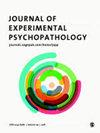How do people with antisocial personality disorder with or without psychopathic personality disorder activate and regulate emotions? Neurovegetative responses during an autobiographical task
IF 1.9
4区 医学
Q4 PSYCHIATRY
引用次数: 0
Abstract
People with antisocial personality disorder (ASPD-nonPPD) are described as insensitive to others and as relentlessly pursuing their goals. A severe form of antisociality is observed in psychopathic personality disorder (ASPD-PPD). In the spectrum of emotional reactivity, people with ASPD-nonPPD present more emotional dysregulation, whereas people with ASPD-PPD exhibit a reduced or nonexistent emotional response. To personally engage people with ASPD-nonPPD and ASPD-PPD, we used emotionally charged autobiographical stimuli, specifically their self-defining memories (SDMs). As these participants exhibit high control over voluntary responses, we measured neurophysiological indicators (heart rate variability (HRV) and electrodermal activity (EDA)). In the resting task and the SDM task, people with ASPD-PPD had significantly higher HRV, suggesting higher emotion regulation abilities. Conversely, the EDA of people with ASPD-nonPPD and ASPD-PPD reflects less activation during the SDM task than when resting. We suggest that people with ASPD-PPD are more adaptive to stimuli that provide less emotional activation. Furthermore, the correlation analysis results suggested that the higher people with ASPD-PPD score on Factor 1 of the Psychopathy Checklist-Revised (PCL-R), the less emotional activation they exhibit. This low activation (EDA) associated with good emotion regulation abilities (HRV) is thought to be the signature of psychopathy.有反社会人格障碍的人有或没有精神病态人格障碍的人是如何激活和调节情绪的?自传体任务中的神经植物反应
反社会人格障碍(aspd -non - ppd)患者被描述为对他人不敏感,无情地追求自己的目标。在精神病态人格障碍(ASPD-PPD)中观察到一种严重形式的反社会行为。在情绪反应谱中,患有反社会人格障碍-非ppd的人表现出更多的情绪失调,而患有反社会人格障碍- ppd的人表现出减少或不存在的情绪反应。为了让患有aspd -非ppd和ASPD-PPD的人参与进来,我们使用了充满情感的自传式刺激,特别是他们的自我定义记忆(SDMs)。由于这些参与者表现出对自愿反应的高度控制,我们测量了神经生理指标(心率变异性(HRV)和皮电活动(EDA))。在静息任务和SDM任务中,ASPD-PPD患者的HRV显著高于SDM任务,表明他们具有更高的情绪调节能力。相反,患有aspd -非ppd和ASPD-PPD的人的EDA在SDM任务期间的激活程度低于休息时。我们认为,患有反社会人格障碍- ppd的人更能适应提供较少情绪激活的刺激。此外,相关分析结果表明,ASPD-PPD患者在心理变态量表(PCL-R)因子1得分越高,他们表现出的情绪激活越少。这种低激活(EDA)与良好的情绪调节能力(HRV)相关,被认为是精神病的特征。
本文章由计算机程序翻译,如有差异,请以英文原文为准。
求助全文
约1分钟内获得全文
求助全文
来源期刊

Journal of Experimental Psychopathology
Medicine-Psychiatry and Mental Health
CiteScore
2.00
自引率
0.00%
发文量
19
审稿时长
11 weeks
期刊介绍:
The Journal of Experimental Psychopathology (EPP) is an open access, peer reviewed, journal focused on publishing cutting-edge original contributions to scientific knowledge in the general area of psychopathology. Although there will be an emphasis on publishing research which has adopted an experimental approach to describing and understanding psychopathology, the journal will also welcome submissions that make significant contributions to knowledge using other empirical methods such as correlational designs, meta-analyses, epidemiological and prospective approaches, and single-case experiments.
 求助内容:
求助内容: 应助结果提醒方式:
应助结果提醒方式:


